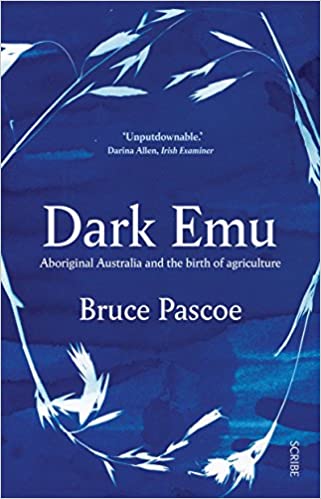
Dark Emu
When I started reading Bruce Pascoe’s account of “Aboriginal Australia and the birth of agriculture”, as Dark Emu is billed on the cover, I must confess I didn’t expect it to be page-turner. But it is. Originally published by Magabala Books in 2014, the book went on to collect various accolades and awards, and in June 2019, a version for younger readers called Young Dark Emu came out. Thematically, it’s a perfect fit in our Green Library series, which looks to postcolonial and of Colour perspectives on the natural world.
Drawing on extensive research, Pascoe takes readers through the practices of Aboriginal and Torres Strait Islander peoples prior to the arrival of colonists in Australia. He looks specifically at agriculture, aquaculture, housing, food storage and preservation, the use of fire for management of the land, as well as linguistic developments, and the systems of government and law embedded in ways of living on and with the land. His research reads across scholarly disciplines, including to great effect findings in archaeology, environmental science and palynology, amongst others. Not only does Pascoe draw on his wide-ranging research, many portions of the book also serve as heartfelt plea for where scholarly attention and – perhaps more to the point – research funding should be directed. Preconceived notions about what Indigenous folks could or couldn’t do have hamstrung the framing of questions asked by researchers and hobbled the pursuit of a clearer understanding of Australian history. Colonial epistemologies, or ways of producing knowledge, are very much still in place. Pascoe offers a wonderfully to the point account of colonialism:
“Invaders like to kill the original owners of the soil they intend to plunder; but, even better than that, they like to humiliate them. Once that hard work is over, their grandsons re-write the history of the re-named land and paint their grandfathers as benevolent visionaries.” (219)
At the heart of the book, then, is an argument for the need of a true history of Indigenous ways of living before first contact with white colonisers. This matters not only as an end in itself, but also has very real consequences for the present and the future. Pascoe’s primary resources are accounts written by early white colonists. The selection already makes a point: even these early occupiers for the most part had to concede that the civilisation they found already in place was a complex and flourishing one – and this in the face of some pre-existing hard-baked racism and a vested interest in legitimizing their land-grabbing. To look carefully, with Pascoe, at what contemporary evidence suggests white colonists actually found when they came to Australia, is to learn about precolonial engineering, architecture and philosophy.
This is fascinating stuff in itself, but arguably the crux of the matter is that it tells a story that flies in the face of some well-worn colonial narratives that are still put to use to maintain essentially colonial (and inherently racist) structures. The colonial story was that white explorers alighted on empty untended land, since Indigenous peoples were of an inferior race and didn’t count, and as such were not advanced enough to know how to properly work the resources all around them. This has fed a national story in which Aboriginals are cast as roaming nomads and primitive hunter-gatherers. Such narratives are instrumentalized even today to dismiss the rights of Aboriginal people to land, and to perpetuate a myth of ‘primitiveness’ in relation to the white settlers. Dark Emu tells another story altogether.
Pascoe’s book is forward-looking in its considerations, because what is at stake is also the future of the planet and a sustainable working of the flora and fauna of Australia. Pascoe argues compellingly that when we look at the evidence without the racial prejudice that brought colonisers to conclude that Indigenous people couldn’t have been deliberately maintaining a sustainable ecology, we will find resources for reimagining sustainable resource management going forward. As such, a little better history could beget a more just present and a more sustainable future.
It’s subject matter being what it is, unless you’re a scholar in one of the relevant fields, it’s entirely possible that some passages might lose you momentarily. But the book’s register is accessible and doesn’t alienate with academic jargon. It brings its concerns close to home with Pascoe’s personal anecdotes, and by giving a sense of how this writer, as researcher and as a person invested in these questions, came to his findings. He writes with sensitivity and a sense of humour – it was my most pleasantly surprising read in a while.
Order the book here and support us! The work behind poco.lit. is done by us – Anna und Lucy. If you’d like to order this book and want to support us at the same time, you can do so from here and we will get a small commission – but the price you pay will be unaffected.
